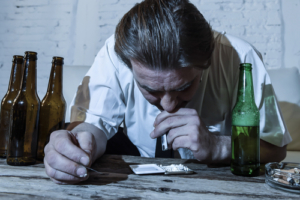 For anyone who regularly takes an addictive substance, it is incredibly difficult to overcome the compulsion to continue. Many people have fallen foul of an addiction, but few manage to break free from the addiction on their own. Fortunately, professional help is available to help counteract dependency on these substances, but it is imperative that the individual is ready to face this battle and to commit to their recovery.
For anyone who regularly takes an addictive substance, it is incredibly difficult to overcome the compulsion to continue. Many people have fallen foul of an addiction, but few manage to break free from the addiction on their own. Fortunately, professional help is available to help counteract dependency on these substances, but it is imperative that the individual is ready to face this battle and to commit to their recovery.
If you know someone who is addicted to drugs, know that these substances change the person on a physical and psychological level. If you have ever wondered why this person can seem like someone else altogether, this is why. Their behavior can be ‘out of character’ and erratic. For most substances, even prescribed painkillers, there will be a need to detox from them. In fact, detoxing is an important part of the recovery process. The body and mind must be free from the substance totally and it takes time and a lot of help for this to happen.
Detoxing
As these substances leave the system and are not replaced, there will be considerable withdrawal symptoms. The detoxing part of the program is a difficult time for anyone and yet, it’s very important. Cravings can be quite intense and during this time, they will be desperate for one more dose, but, without it, there may be a reversal of the symptoms which would normally be expected.
When medical professionals talk about the detox process, they consider the timeframe necessary to rid the body of these drugs. Depending on the individual and the symptoms experienced, the medical team may decide to use alternative substances to help counteract the symptoms of withdrawal and this can reduce the time in detox. This is on an individual basis, however.
There are many different drugs and so, withdrawal and recovery will take varying lengths of time. Some drugs i.e. some prescribed medications will start to leave the body within a day or so, certainly, they will be out of the system within a week after total abstinence.
Symptoms experienced include:
- Nausea
- Tension
- Headaches
- Palpitations
- High blood pressure
For amphetamines, the detox is very quick and certainly, those who use these drugs would normally have to keep topping up their dose just so to achieve the same high as they do not last long. Once the individual has been taking these substances for a period of weeks, they are likely to start to experience severe crashes that can last for hours or days.
When it comes to detoxing, it can take approximately three weeks for the process to be complete and there may be intense physical cravings during this time. There will be many symptoms including:
- Psychological changes
- Depression
- Paranoia
- Anxiousness
Every individual is treated as being unique and so a personal treatment plan is devised. An approximate time frame is given but there are many things that can affect this estimation.
- Genetics
- How long the addiction has been ongoing
- General health
- Psychological health
- How the drug is taken
- The quantity is taken per dose
Therapy is often needed for months or even years following detox to help each person have a fighting chance of regaining their lives back.
Drug Rehabilitation Programs
Professional, medical rehabilitation programs are so important. This is because most people cannot manage to detox alone. They need support and professional medical attention. Even with this support and expertise, there is the potential for relapse, but less so than when struggling on their own. Certainly, anyone with an addiction must endure a difficult time so to detox fully and to break free from the substance. Fortunately, there are many different types of drug rehabilitation programs available and it is worth checking them out to find the best ones for the individual in question.
